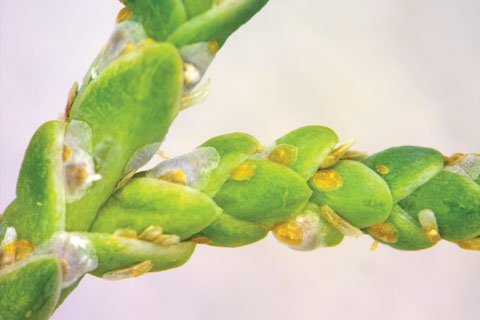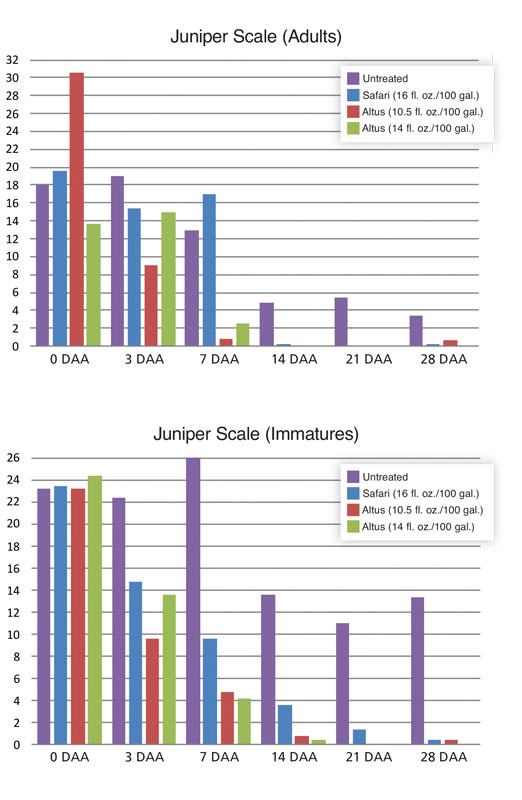6/1/2019
Effective Control of Piercing-Sucking Pests
Dr. Aaron Palmateer

Recent demands from big box retailers prohibiting the use of neonicotinoid insecticides in commercial ornamental production has growers searching for alternative options for insect management. To magnify this challenge further, there’s also a growing occurrence of resistant pest species—like aphids and whiteflies—which make that demand even more crucial.
Pictured: Juniper scale infestation of Angelica Blue Juniper.
Amid these opportunities for advancement, growers need solutions that manage troublesome insect pests while offering compatibility with beneficial arthropods, as well as certain pollinators like honey bees and bumblebees. As an answer to that need, Bayer developed flupyradifurone, the active ingredient featured in Altus insecticide, for the ornamentals market.
Flupyradifurone is the first and only active ingredient in a unique class of chemistry called butenolides. Butenolides are chemically distinct from neonicotinoids, yet possess a similar ability to move throughout the plant to provide lasting protection from certain insects, including some of the most troublesome piercing-sucking pests.
Altus provides growers with an easy-to-use, long-lasting solution for control of sucking pests. Offering flexibility, efficacy and selectivity, it’s a valuable tool for growers working with customers that demand non-neonicotinoid alternatives.

Research reveals efficacy of Altus insecticide for key piercing-sucking pests
Recently, there’s been extensive research into the efficacy of Altus on key pests. In September 2018, Dr. Karla Addesso, Research Associate Professor at the Otis L. Floyd Nursery Research Center of Tennessee State University, conducted an in-depth trial to validate a hypothesis that a foliar spray application of Altus can prevent juniper scale infestation of Angelica Blue, Juniperus chinensis (Figure 1).
Angelica Blue rooted cuttings were transplanted into 1-gal. containers and fertilized with Osmocote 18-6-12 slow-release fertilizer, then irrigated daily by drip irrigation. The insecticide treatments consisted of Altus applications as a foliar spray at both the lowest and highest labeled rate for scale insects: 10.5 fl. oz./100 gal. and 14 fl. oz./100 gal., respectively. These applications were compared to Safari, which was applied as a foliar spray at 16 fl. oz./100 gal. Foliar treatments were sprayed to thoroughly wet foliage to the point of drip. Untreated checks were sprayed with water. All plants used in the trial were naturally infested with immature and adult scales.
Adult juniper scale population eliminated in 14 days
Results showed that applications of Altus at both the low (10.5 fl. oz./100 gal.) and high rates (14 fl. oz./100 gal.) significantly reduced the adult juniper scale population by Day 7. Trees that were treated with Safari took two weeks to see similar results. By Day 14, both Altus and Safari treatments provided 100% control of the adult juniper scales.
100% immature juniper scale mortality in 14 days
While the average count of immatures on Day 0 was roughly identical across all plants in the trial, by Day 7, the Altus-treated trees at both the high and low rate had about half as many immatures as those treated with Safari. Altus provided 100% control of juniper scale immatures by Day 14, while trees treated with Safari were still showing some level of infestation. Results from this trial demonstrate that Altus provides effective control of juniper scale when applied at both the low and high application rates.
Promising results for Altus
These results are highly encouraging for growers seeking effective, targeted control of piercing-sucking pests. Studies like this one continue to show that Altus can not only achieve similar results to neonicotinoids, but actually work faster in certain situations. Given its compatibility with honey bees, bumblebees and other beneficial insects, Altus appears to be a good fit for Integrated Pest Management programs and today’s changing market.
To learn more, visit es.bayer.us/altus. GT
ALWAYS READ AND FOLLOW LABEL INSTRUCTIONS
Bayer Environmental Science, a Division of Bayer CropScience LP, 5000 CentreGreen Way, Suite 400, Cary, NC 27513. For additional product information, call toll-free 1-800-331-2867. environmentalscience.bayer.us. Not all products are registered in all states. Bayer, the Bayer Cross and Altus are registered trademarks of Bayer. Safari is a registered trademark of Valent USA LLC. © 2019 Bayer CropScience LP. ES-319-ALT-23-A-R1
Aaron Palmateer, Ph.D. is a Senior Technical Support Representative for Bayer.